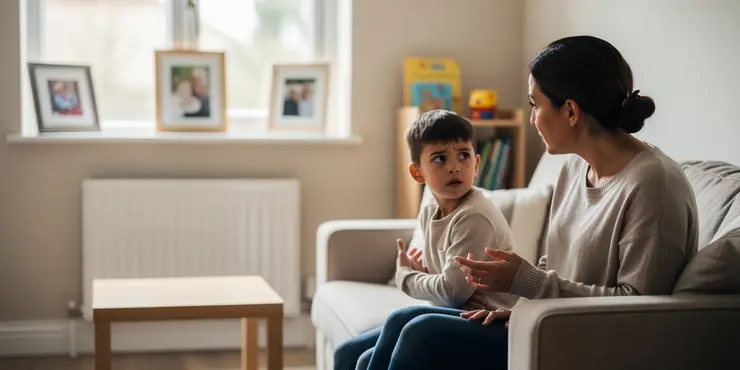
Find Help
More Items From Ergsy search
-
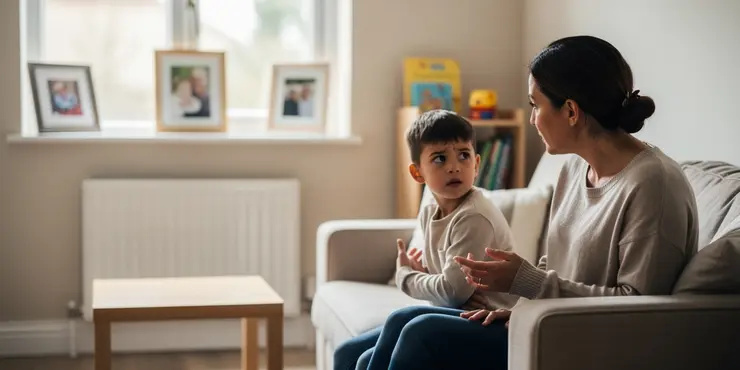
What is the role of parental monitoring in children's screen time and sleep?
Relevance: 100%
-
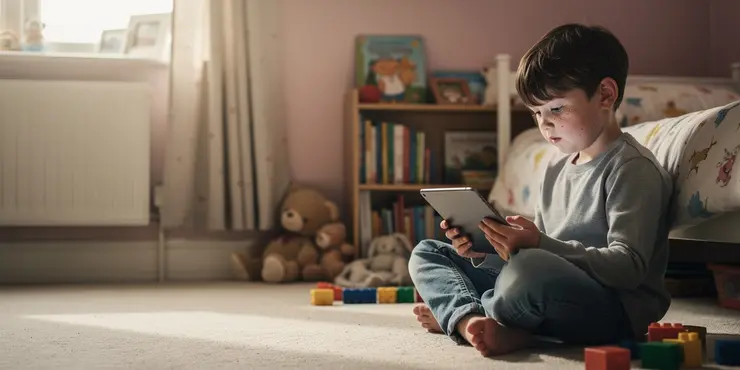
Are children more affected by screen time in relation to sleep than adults?
Relevance: 68%
-
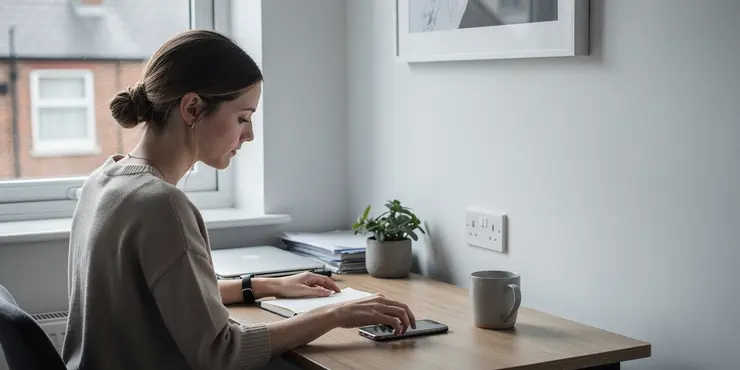
How does screen time affect sleep quality?
Relevance: 56%
-
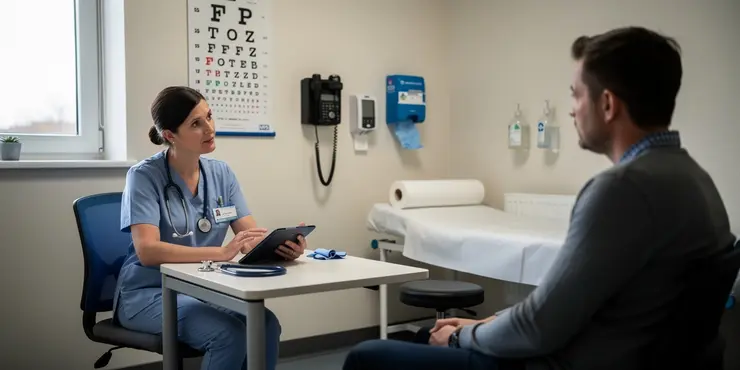
Study Shows Link Between Screen Time and Sleep Quality
Relevance: 54%
-
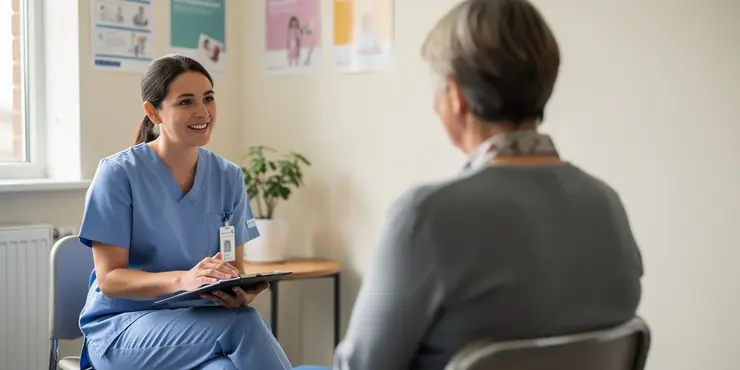
Does screen time affect both sleep onset and sleep maintenance?
Relevance: 54%
-
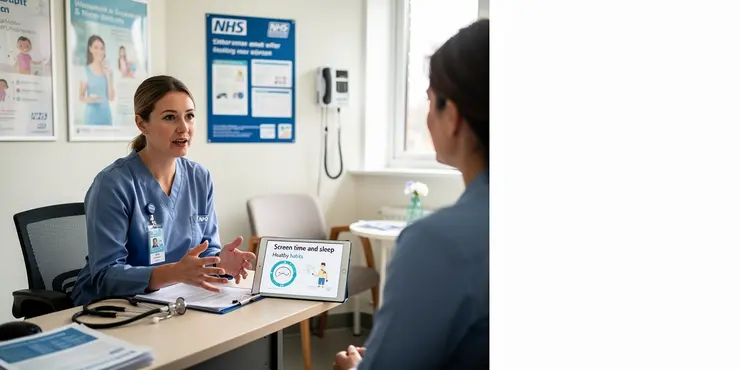
Does screen time impact REM sleep?
Relevance: 52%
-
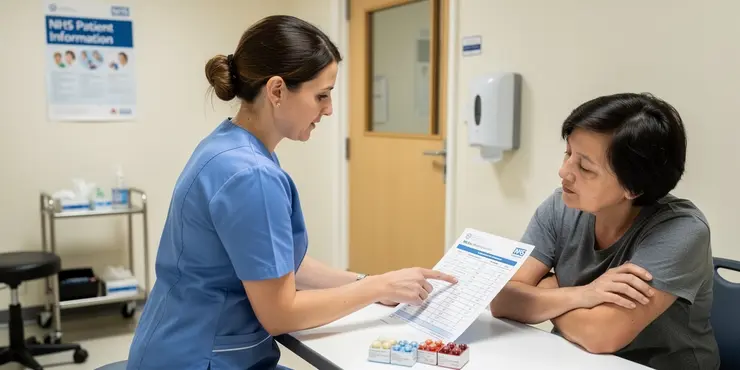
What are some tips for reducing screen time to improve sleep?
Relevance: 52%
-
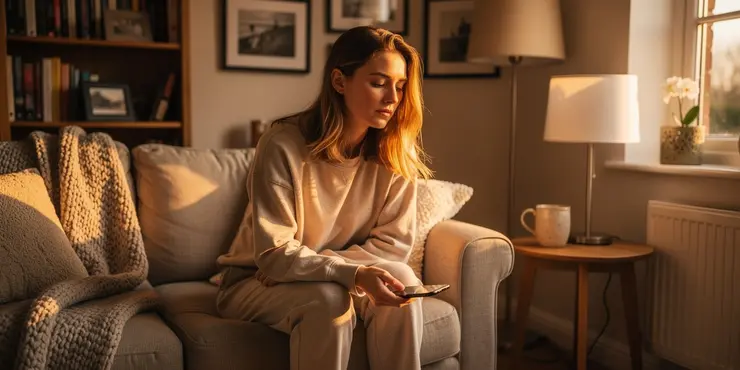
Can reducing screen time improve sleep quality?
Relevance: 52%
-
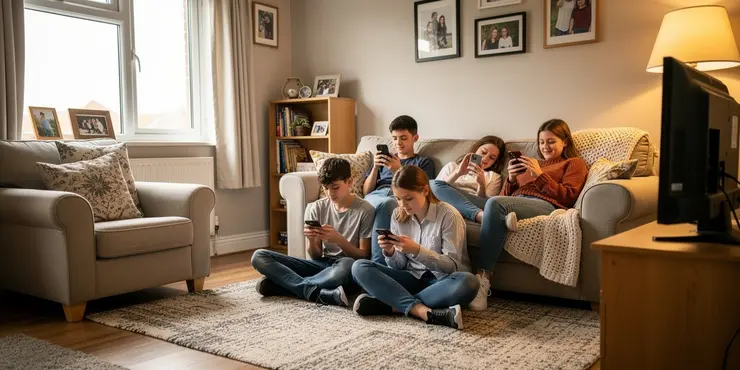
What demographic showed the most significant change in sleep quality due to screen time?
Relevance: 50%
-

Is there a difference in screen time impact on sleep between weekdays and weekends?
Relevance: 50%
-
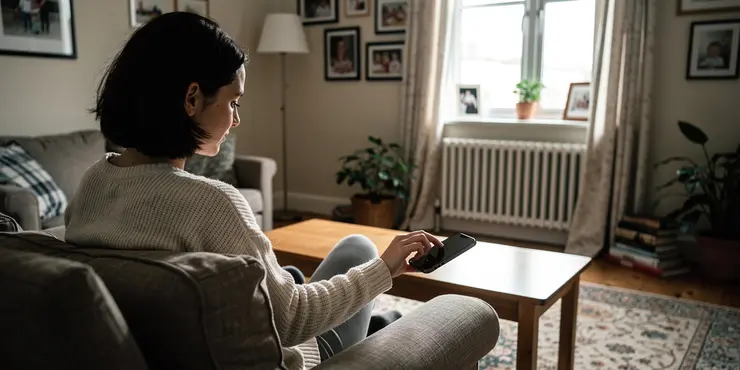
Are there any screen time guidelines recommended for improving sleep?
Relevance: 49%
-
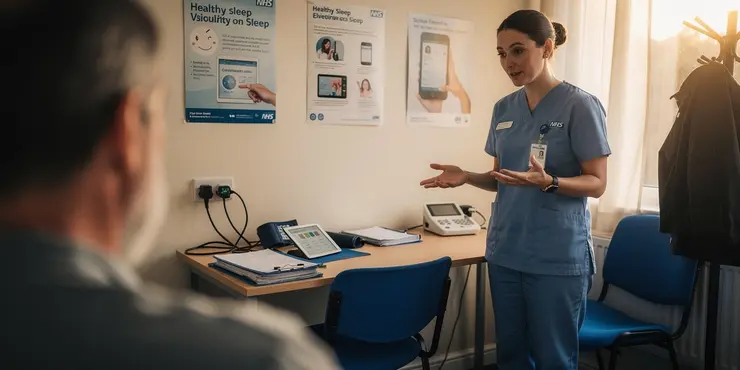
What is the main finding of the study linking screen time to sleep quality?
Relevance: 49%
-
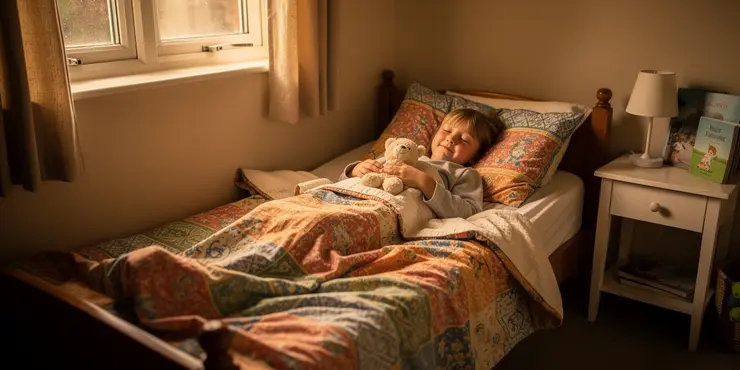
Can children have sleep apnea?
Relevance: 45%
-
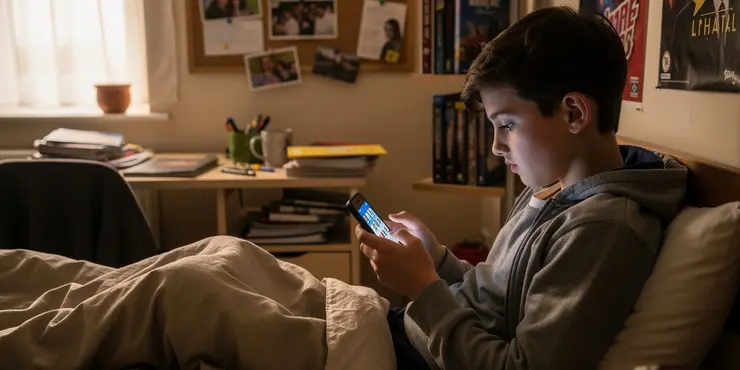
How does screen time before bed specifically affect adolescents?
Relevance: 44%
-
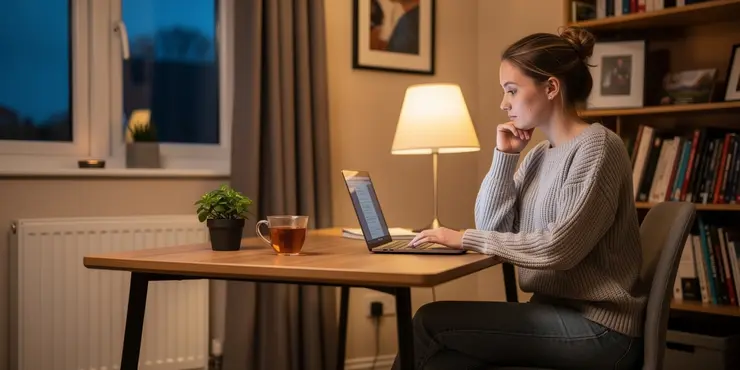
Is blue light from screens a factor in affecting sleep quality?
Relevance: 39%
-
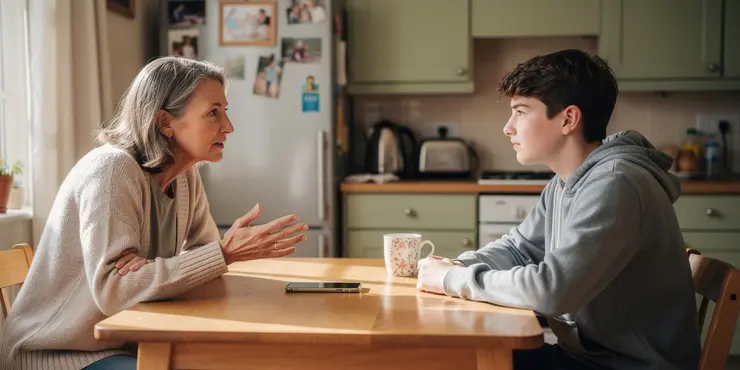
Could parents override a social media ban for their under 16 children?
Relevance: 38%
-
What online safety measures can parents implement?
Relevance: 37%
-
What role do parents play in the social media ban?
Relevance: 34%
-
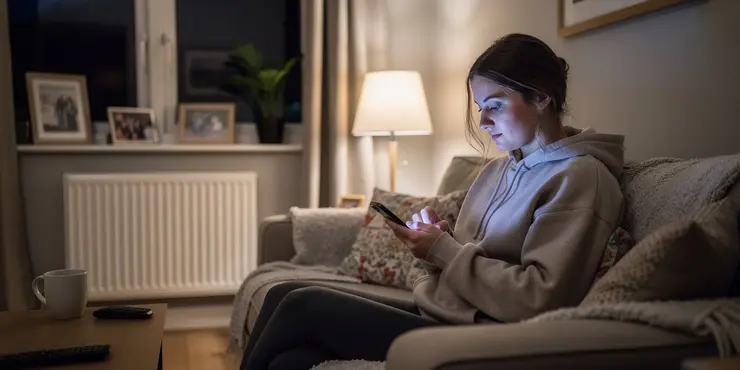
What are some long-term effects of poor sleep quality linked to screen time?
Relevance: 33%
-
Is screening painful or risky for my child?
Relevance: 32%
-
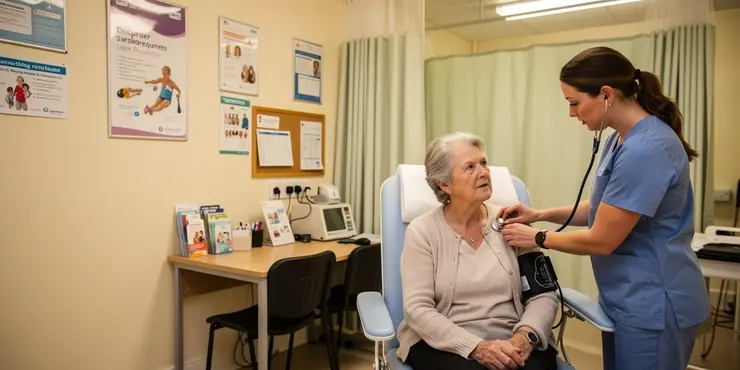
Is it safe to sleep after a concussion?
Relevance: 32%
-
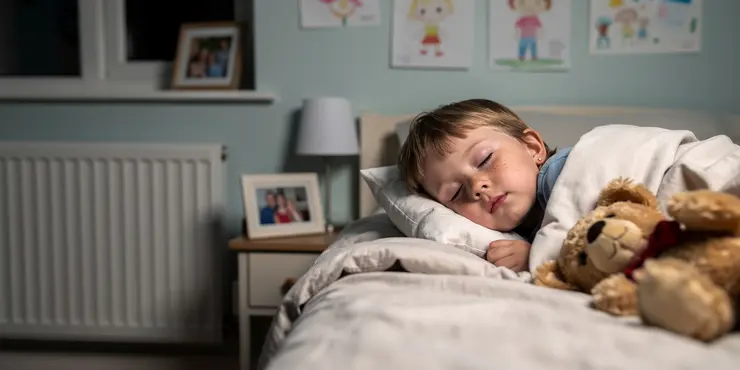
The Importance of Sleep for All Ages
Relevance: 32%
-
How often should screening be conducted if my child is at risk?
Relevance: 31%
-
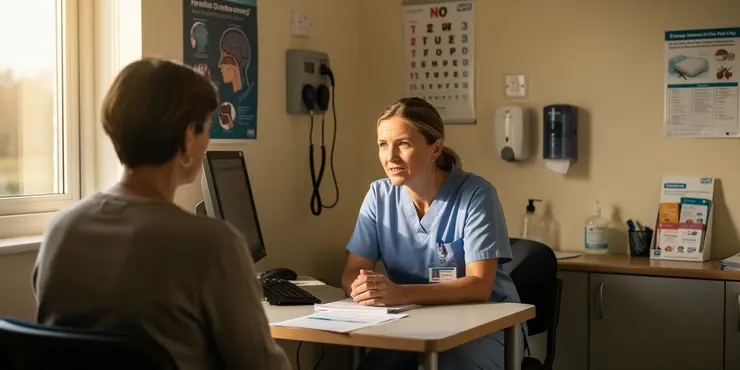
Does sleep apnea occur only in adults?
Relevance: 30%
-
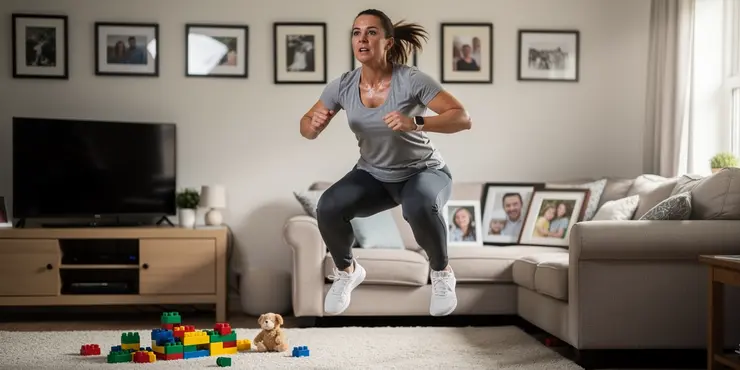
Exercise Routines for Busy Parents
Relevance: 30%
-
Why should I consider screening my child for type 1 diabetes?
Relevance: 29%
-
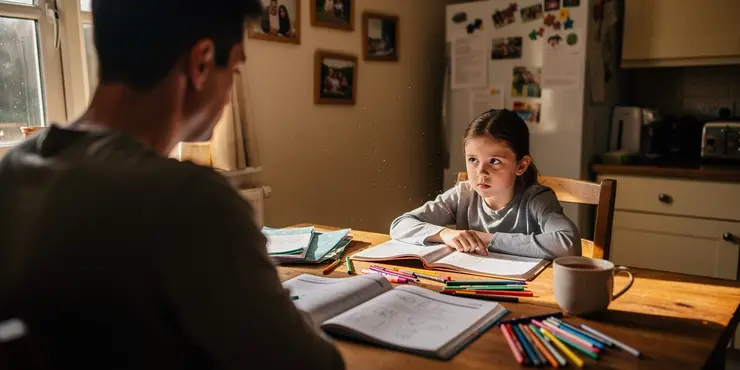
How are parents involved in the SEND process?
Relevance: 29%
-
Should I screen my child for type 1 diabetes?
Relevance: 29%
-
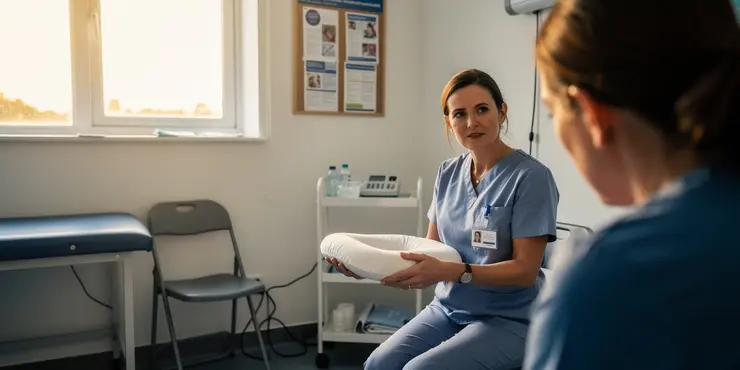
Are there any benefits to using baby sleep pillows?
Relevance: 29%
-
Should siblings of a child with type 1 diabetes also be screened?
Relevance: 28%
-
Have children found ways to circumvent the social media ban?
Relevance: 28%
-
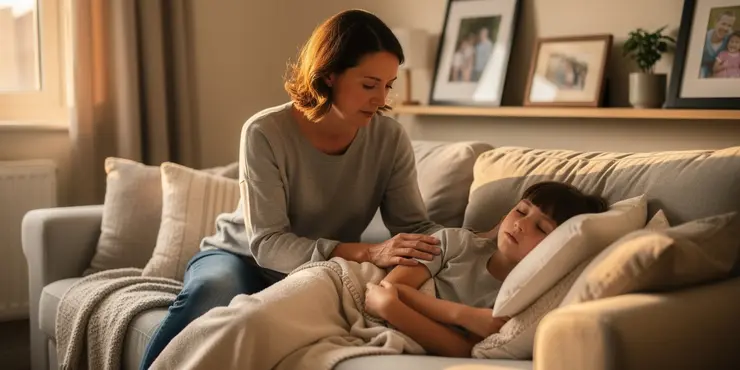
Is it safe to sleep after a concussion?
Relevance: 28%
-
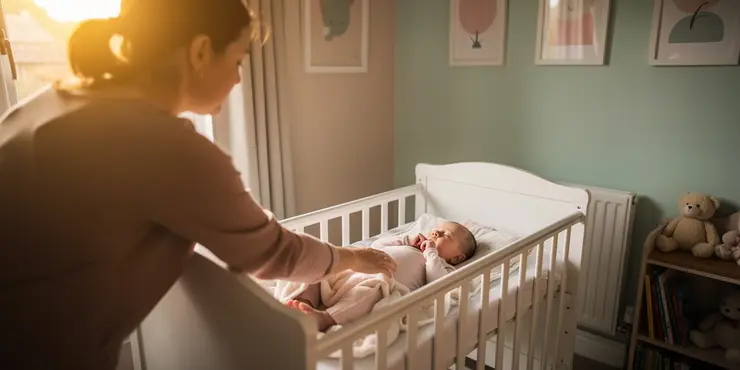
What is the safest sleep environment for an infant?
Relevance: 28%
-
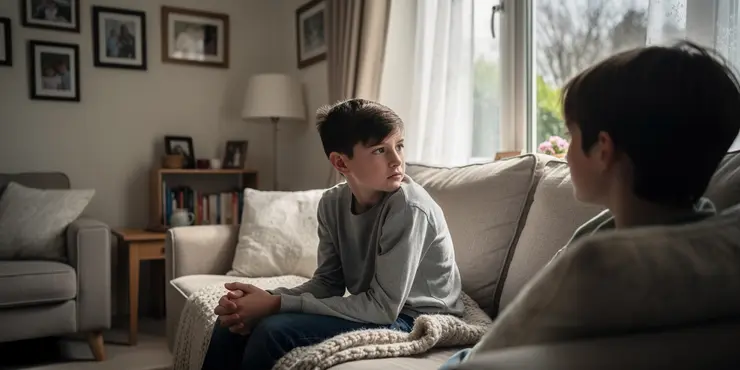
What type of anxiety do children and teenagers experience?
Relevance: 28%
-

Are children more susceptible to concussions than adults?
Relevance: 27%
-
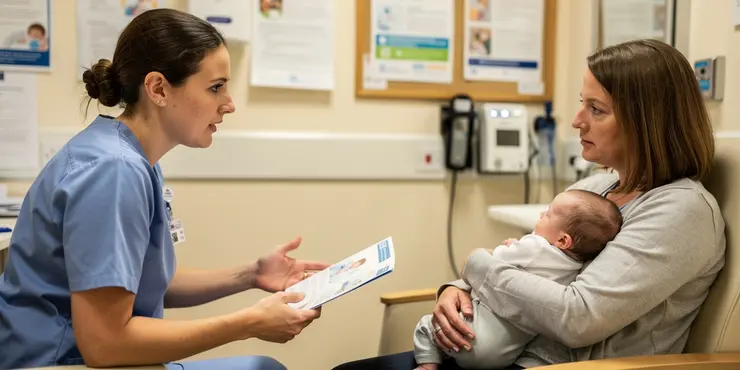
What are the risks associated with baby sleep pillows?
Relevance: 27%
-
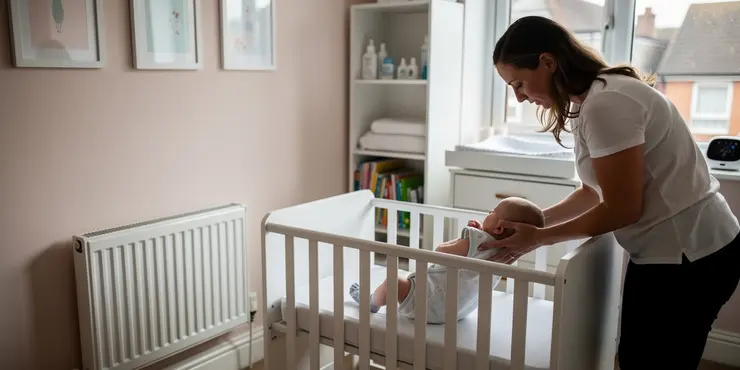
What steps can I take to ensure my baby's safety while sleeping?
Relevance: 27%
-

Are there any regulations on the sale of baby sleep pillows?
Relevance: 27%
-
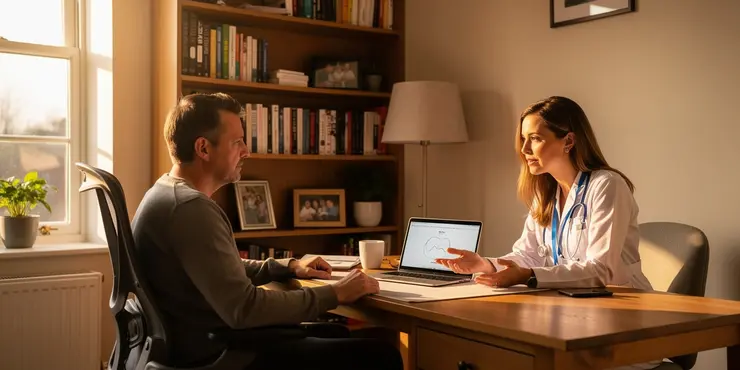
How is sleep apnea diagnosed?
Relevance: 27%
-
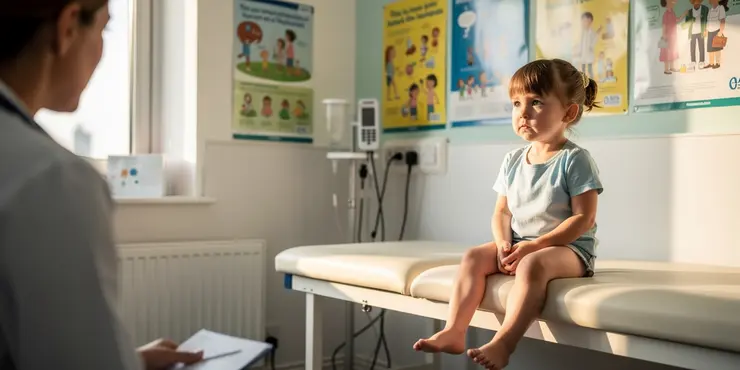
Can children use Mounjaro?
Relevance: 27%
Introduction to Parental Monitoring
Parental monitoring plays a crucial role in children's development, particularly in managing screen time and ensuring adequate sleep. In the UK, where children’s use of technology is pervasive, effective monitoring can help mitigate negative impacts of excessive screen time such as obesity, behavioural issues, and poor academic performance. Parents who actively monitor their children’s screen use are better positioned to maintain a balanced lifestyle for their kids.
The Impact of Screen Time on Sleep
Excessive screen time can significantly disrupt children's sleep patterns. The blue light emitted from screens can interfere with the production of melatonin, the hormone responsible for regulating sleep. As a result, children may find it difficult to fall asleep, leading to insufficient rest and consequently impacting cognitive functioning and emotional wellbeing. Parental monitoring is essential to ensure that screen time is appropriately managed, particularly before bedtime.
Strategies for Parental Monitoring
There are several effective strategies parents in the UK can employ to monitor their children's screen time and promote better sleep. Setting clear boundaries and consistent rules regarding when and how long screens can be used is fundamental. For instance, establishing a 'no screens in the bedroom' rule can prevent screen usage from affecting sleep. Parents should also consider implementing 'screen-free' times or zones within the house to encourage other activities such as reading or playing outside.
Additionally, using technology to their advantage, parents can utilise parental control apps and built-in device settings that limit screen time and schedule downtime. These tools allow parents to track usage and enforce restrictions remotely.
The Importance of Healthy Habits
Beyond controlling screen time, fostering healthy habits is vital. Encouraging children to engage in physical activities and have regular sleep schedules strengthens their overall development. By leading by example, parents can model good practices themselves, such as turning off screens an hour before bed and keeping devices out of the bedroom.
Conclusion
In conclusion, parental monitoring is an indispensable element in managing children's screen time and ensuring they get adequate sleep. By adopting structured rules, utilising technology, and promoting a balanced lifestyle, parents can help their children develop positive habits that contribute to their wellbeing. Given the significant impact of technology on today’s youth, it is more important than ever for UK parents to invest time and effort in guiding their children’s media consumption. In doing so, they prepare their children for a healthier and more productive future.
What is Parental Monitoring?
Looking after what your children watch and play on screens is important. It helps them grow up healthy. In the UK, children use phones and computers a lot. Watching them carefully helps keep them healthy and doing well in school. It stops problems like being overweight and behaving badly.
How Screen Time Affects Sleep
Too much screen time can make it hard for kids to sleep. The bright light from screens can stop a sleep chemical in the brain. This makes it hard for kids to feel sleepy. Without enough sleep, kids might have trouble thinking and feeling good. Watching screen time, especially before bed, can help them sleep better.
Ways to Help with Screen Time
Parents in the UK can do many things to help with screen time. Make clear rules about when and how long kids can use screens. For example, no screens in bedrooms helps at night. Also, have times or places with no screens, like for reading or playing outside.
Parents can use special apps to control screen time too. These tools can help track usage and set time limits.
Healthy Habits
Helping kids make good habits is important. This means getting kids to play outside and sleep on time. Parents can show good habits too, like turning off screens before bed and keeping phones out of bedrooms.
Conclusion
Watching what kids do on screens helps them sleep and grow better. By making rules, using tools, and teaching good habits, parents help kids be healthy. In today's world, it's very important for parents in the UK to guide their kids when they use technology. This helps kids have a bright future.
Frequently Asked Questions
What is parental monitoring in the context of children's screen time?
Parental monitoring involves overseeing and managing the amount and type of content children access on screens, ensuring a balanced use of digital devices.
Why is parental monitoring important for children's screen time?
Parental monitoring is crucial to ensure children have a healthy balance between screen use and other activities, reducing the risk of negative effects on their development and well-being.
How does excessive screen time affect children's sleep?
Excessive screen time, especially before bed, can interfere with children's sleep by disrupting their circadian rhythm and reducing melatonin production.
What strategies can parents use to monitor children's screen time?
Parents can use strategies like setting time limits, using parental control software, and encouraging non-screen activities to help manage children's screen time.
At what age should parental monitoring of screen time begin?
Parental monitoring should begin as soon as children start using digital devices, typically around the age of 2.
What is the recommended screen time for children?
The American Academy of Pediatrics recommends no more than 1 hour of screen time per day for children aged 2 to 5, and consistent limits for older children.
How can parents create a healthy sleep environment for children?
Parents can create a healthy sleep environment by establishing a bedtime routine, keeping screens out of the bedroom, and ensuring the room is dark and quiet.
Can screen time be educational for children?
Yes, screen time can be educational if it involves high-quality, age-appropriate educational content that engages children and complements their learning.
What signs indicate that screen time is affecting a child's sleep?
Signs include difficulty falling asleep, frequent waking during the night, and daytime sleepiness.
How can parents discuss screen time limits with their children?
Parents can discuss screen time limits by setting clear rules, explaining the reasons for these limits, and involving children in the decision-making process.
What role does consistency play in parental monitoring?
Consistency is key in establishing routines and boundaries, helping children understand expectations and reducing resistance to screen time limits.
How can parents model healthy screen habits for their children?
Parents can model healthy habits by limiting their own screen use, prioritizing face-to-face interactions, and demonstrating alternative leisure activities.
Should screen time be completely eliminated before bedtime?
It is advised to eliminate screen time at least 1 hour before bedtime to promote better sleep and prepare children for a restful night.
How do social media and gaming impact children's screen time?
Social media and gaming can significantly increase screen time usage and may lead to addictive behaviors that affect sleep and daily routines.
Are there specific apps or tools for parental monitoring of screen time?
Yes, there are numerous apps and tools available, such as Family Link, Screen Time Parental Control, and others, to help parents monitor and control their children's screen activities.
Can digital detox periods benefit children's screen time management?
Digital detox periods can benefit children by reducing dependency on screens, promoting alternative forms of engagement, and enhancing overall well-being.
What role do educational institutions play in managing children's screen time?
Schools can play a supportive role by educating children and parents about healthy digital habits and integrating balanced media use within the curriculum.
How can parents encourage alternative activities to screen time?
Parents can encourage alternatives by engaging in family activities, promoting outdoor play, encouraging hobbies, and scheduling regular screen-free times.
How can screen time rules be adjusted as children grow?
Screen time rules can be adjusted by considering the child's maturity, educational needs, and family dynamics, ensuring flexibility while maintaining healthy habits.
What are the long-term benefits of parental monitoring of screen time?
Long-term benefits include improved sleep patterns, better academic performance, healthier social interactions, and a well-rounded lifestyle.
What is Parental Monitoring for Kids' Screen Time?
Parental monitoring means watching how much time kids spend on phones, tablets, or computers. It also means making sure what they look at is safe and okay for them.
Parents can set time limits, choose what kids can watch, and help them find good things to do online.
Tools like apps can help parents check screen time. Talking with kids about what they do on screens is also helpful.
Parental monitoring means watching and checking what children look at on screens. This helps make sure they use phones, tablets, and computers in a good way.
Why Should Parents Watch How Much Screen Time Kids Have?
It is good for parents to see how much time their kids spend on screens. Watching TV, playing games, or using phones and tablets for too long can be bad for kids.
Parents can help by:
- Setting time limits for screen use.
- Encouraging kids to play outside and do other fun things.
- Using apps or timers to keep track of screen time.
Parents need to watch how much time kids spend on screens. This helps kids do lots of different things, not just use screens. It keeps kids healthy and happy.
How does too much screen time affect children's sleep?
Spending too much time on screens like phones, tablets, or TVs can make it hard for children to sleep well. Screens give off a bright light that can confuse the brain and make it think it is still daytime. This can stop children from feeling sleepy at night.
Using screens too much before bed can also make children too excited or worried, making it hard to relax and fall asleep.
To help children sleep better, it's a good idea to turn off screens at least one hour before bedtime. Doing relaxing activities, like reading a book or listening to calming music, can help children get ready for sleep.
Too much screen time, especially before bedtime, can make it hard for children to sleep. This is because it can mix up their body clock and stop their brain from making the sleep hormone, melatonin.
Some helpful tips include:
- Turn off screens at least one hour before bed.
- Do quiet activities like reading or drawing.
- Keep bedrooms screen-free if possible.
How can parents keep an eye on how much time their kids spend on screens?
- **Set time limits:** Decide how long your child can use screens each day. - **Use apps:** There are apps that help you check and control screen time. - **Create a schedule:** Plan when screen time is okay, like after homework. - **Watch together:** Join in when your child uses a screen to see what they do. - **Encourage breaks:** Remind your child to take breaks and do other fun things.Parents can help manage screen time by:
- Setting rules about how long kids can use screens.
- Using special apps to control what kids see on screens.
- Encouraging kids to do fun things that don't need a screen, like playing outside or reading books.
When should parents start checking how much screen time kids have?
Parents should start keeping an eye on kids when they use phones or tablets. This usually starts when they are about 2 years old.
How much time should kids spend looking at screens?
Doctors say kids 2 to 5 years old should not have more than 1 hour of screen time a day. For older kids, keep the rules the same each day.
How can parents make a good sleep place for kids?
Here are some tips to help parents:
- Make the room dark and quiet at bedtime.
- Keep the bedroom cool and comfy.
- Have a bedtime routine like a story or a bath.
- Remove screens, like phones or tablets, before sleep.
- Let them have a favorite toy or blanket.
Tools that can help:
- Use a nightlight if they are scared of the dark.
- Play soft music or white noise to relax them.
Doing these things can help kids sleep better.
Parents can help children sleep well by doing a few simple things. They can make a bedtime routine, keep screens like TVs and tablets out of the bedroom, and make sure the room is dark and quiet.
Can kids learn from screen time?
Some screen time can help kids learn. Here are some tips to help:
- Choose apps and shows that teach new things.
- Watch with the kids and talk about what they see.
- Set time limits for how long kids can use screens.
- Balance screen time with other activities like playing outside or reading books.
Remember, not all screen time is bad. It's about making good choices!
Yes, screen time can help kids learn. It works well when the content is good, right for their age, and makes learning fun.
How can you tell if screen time is making it hard for a child to sleep?
Signs include problems falling asleep, waking up often at night, and feeling sleepy during the day.
How can parents talk about screen time with their children?
Parents can talk to their kids about how much time they spend on phones, tablets, and computers. It's important to agree on rules together.
Here are some tips for parents:
- Ask your child how they feel about screen time.
- Explain why it's good to have screen time rules.
- Make a plan for screen time together. Use a chart or timer to help.
- Use fun apps to track and set screen time limits.
- Take breaks from screens to do other fun activities.
Talking and planning together can make screen time better for everyone!
Parents can talk about how long kids can use screens. They should make simple rules, tell why the rules are important, and let kids help make the rules too.
Why is it important for parents to be consistent?
Consistency means doing the same thing each time. It helps kids know what to expect. Parents who are consistent help kids feel safe.
Tips to help parents be consistent:
- Make clear rules and stick to them.
- Set a routine, like bedtime at the same time every night.
- Praise kids when they follow rules.
- Use reminders, like charts or lists.
It is important to have the same rules every day. This helps kids know what to do. It makes sure they follow screen time rules and don’t get upset when it’s time to stop.
How can parents show good screen time habits to their kids?
Here are some ways parents can show their kids how to use screens in a healthy way:
- Limit screen time: Set a specific amount of time for using TVs, tablets, and phones each day.
- Screen-free zones: Create no-screen areas in the home, like the dining room or bedrooms.
- Be a role model: Parents should also follow the rules they set for their children.
- Spend time together: Do fun activities that don't involve screens, like playing games or going for a walk.
- Talk about screens: Explain why it's important to have rules about screens and how it helps keep them healthy.
Tools like timers can help manage screen time. Remind your kids why screen breaks are good for them.
Parents can show good habits by using screens less, spending more time talking to people, and doing fun things without screens.
Is it a good idea to stop using screens before bed?
Looking at screens like TVs, tablets, or phones before bed might make it hard to sleep well.
Here are some tips:
- Try to stop using screens at least 1 hour before bedtime.
- Read a book or listen to soft music instead.
- If you need help, you can use blue light filters on your screen to make it easier to sleep.
Stop using screens like tablets, phones, or TVs at least 1 hour before bedtime. This helps kids sleep better and get ready for a good night's rest.
How do social media and gaming affect children's time on screens?
Social media and games can make kids spend a lot of time looking at screens.
Here are some tips to help manage screen time:
- Set a timer to remind you when to take a break from the screen.
- Create a schedule that shows when to play games or use social media.
- Find fun activities to do away from the screen, like playing outside or drawing.
- Ask a grown-up to help set rules for screen time.
Using social media and playing games can make us spend a lot of time in front of screens. This can become a bad habit, like an addiction, and it might mess up our sleep and daily activities.
Are there special apps to help parents watch screen time?
Parents can use apps to see how much time kids spend on screens. These apps help you set time limits and see what apps kids use.
You can try apps like:
- Screen Time: This app helps you set rules for screen use.
- Family Link: This Google app lets parents set screen time and approve apps.
- Norton Family: It helps parents keep track of what kids do online.
It's good to talk to kids about screen time. Make sure to use these apps to teach healthy screen habits.
Yes, there are many apps and tools to help parents watch and manage their kids' screen use. Some popular ones are Family Link and Screen Time Parental Control.
Can taking breaks from screens help kids manage screen time better?
Taking breaks from screens can be good for kids. It helps them not depend on screens so much. They can play or do other fun things instead. This makes them feel better and happier.
Tools like screen-time limits can help. Also, having a schedule can be good. Families can play games together or read books as fun activities without screens.
How do schools help manage kids' screen time?
Schools can help kids spend less time on screens. Teachers can show kids fun things to do without screens, like playing outside or reading. Schools can also talk to parents about healthy screen habits. Using timers or special apps can help remind kids to take breaks from screens.
Schools can help by teaching kids and parents good ways to use digital devices. They can include smart media use in what they teach at school.
How can parents help kids do things other than watch screens?
Parents can do many things to help kids play without screens. Here are some ideas:
- Play games or do puzzles together.
- Read books with your child or tell them stories.
- Go outside to play, ride a bike, or take a walk.
- Do arts and crafts, like drawing or painting.
- Involve your child in cooking simple meals or baking.
- Set up playdates with friends or family.
Here are some tools or ideas to make it easier:
- Create a "no-screen" time each day for everyone.
- Use timers to keep track of screen time and play time.
- Have a box of toys or activities that your child can choose from.
Remember, it's important to join your child sometimes and have fun together!
Parents can help by doing fun things together as a family, playing outside, trying new hobbies, and having times when screens are not used.
How can screen time rules change as kids get older?
Ways to help:
- Talk with your child about screen time.
- Set rules together.
- Use timers or apps to help manage time.
- Encourage breaks and activities outside.
- Be a good role model with screen use.
You can change screen time rules to fit your child's age and needs. Think about how grown-up they are, what they need for school, and how your family runs. Be open to changes, but also keep good habits.
Why is it good for parents to watch how much time kids spend on screens?
Over a long time, you can sleep better, do well in school, make good friends, and have a healthy life.
Useful Links
This website offers general information and is not a substitute for professional advice.
Always seek guidance from qualified professionals.
If you have any medical concerns or need urgent help, contact a healthcare professional or emergency services immediately.
Some of this content was generated with AI assistance. We’ve done our best to keep it accurate, helpful, and human-friendly.
- Ergsy carfully checks the information in the videos we provide here.
- Videos shown by Youtube after a video has completed, have NOT been reviewed by ERGSY.
- To view, click the arrow in centre of video.
- Most of the videos you find here will have subtitles and/or closed captions available.
- You may need to turn these on, and choose your preferred language.
- Go to the video you'd like to watch.
- If closed captions (CC) are available, settings will be visible on the bottom right of the video player.
- To turn on Captions, click settings .
- To turn off Captions, click settings again.
More Items From Ergsy search
-

What is the role of parental monitoring in children's screen time and sleep?
Relevance: 100%
-

Are children more affected by screen time in relation to sleep than adults?
Relevance: 68%
-

How does screen time affect sleep quality?
Relevance: 56%
-

Study Shows Link Between Screen Time and Sleep Quality
Relevance: 54%
-

Does screen time affect both sleep onset and sleep maintenance?
Relevance: 54%
-

Does screen time impact REM sleep?
Relevance: 52%
-

What are some tips for reducing screen time to improve sleep?
Relevance: 52%
-

Can reducing screen time improve sleep quality?
Relevance: 52%
-

What demographic showed the most significant change in sleep quality due to screen time?
Relevance: 50%
-

Is there a difference in screen time impact on sleep between weekdays and weekends?
Relevance: 50%
-

Are there any screen time guidelines recommended for improving sleep?
Relevance: 49%
-

What is the main finding of the study linking screen time to sleep quality?
Relevance: 49%
-

Can children have sleep apnea?
Relevance: 45%
-

How does screen time before bed specifically affect adolescents?
Relevance: 44%
-

Is blue light from screens a factor in affecting sleep quality?
Relevance: 39%
-

Could parents override a social media ban for their under 16 children?
Relevance: 38%
-
What online safety measures can parents implement?
Relevance: 37%
-
What role do parents play in the social media ban?
Relevance: 34%
-

What are some long-term effects of poor sleep quality linked to screen time?
Relevance: 33%
-
Is screening painful or risky for my child?
Relevance: 32%
-

Is it safe to sleep after a concussion?
Relevance: 32%
-

The Importance of Sleep for All Ages
Relevance: 32%
-
How often should screening be conducted if my child is at risk?
Relevance: 31%
-

Does sleep apnea occur only in adults?
Relevance: 30%
-

Exercise Routines for Busy Parents
Relevance: 30%
-
Why should I consider screening my child for type 1 diabetes?
Relevance: 29%
-

How are parents involved in the SEND process?
Relevance: 29%
-
Should I screen my child for type 1 diabetes?
Relevance: 29%
-

Are there any benefits to using baby sleep pillows?
Relevance: 29%
-
Should siblings of a child with type 1 diabetes also be screened?
Relevance: 28%
-
Have children found ways to circumvent the social media ban?
Relevance: 28%
-

Is it safe to sleep after a concussion?
Relevance: 28%
-

What is the safest sleep environment for an infant?
Relevance: 28%
-

What type of anxiety do children and teenagers experience?
Relevance: 28%
-

Are children more susceptible to concussions than adults?
Relevance: 27%
-

What are the risks associated with baby sleep pillows?
Relevance: 27%
-

What steps can I take to ensure my baby's safety while sleeping?
Relevance: 27%
-

Are there any regulations on the sale of baby sleep pillows?
Relevance: 27%
-

How is sleep apnea diagnosed?
Relevance: 27%
-

Can children use Mounjaro?
Relevance: 27%


